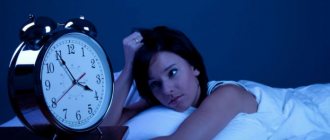How do most of us feel after a sleepless night? Tired, irritable and seemingly “out of place.” But night sleep lasting less than the recommended 7-9 hours does not just make a person distracted and nervous. The consequences of chronic sleep deprivation are much more serious and can cause a variety of health problems: from weight gain to a weakened immune system.
Symptoms
A person with a lack of sleep has characteristic symptoms reminiscent of the onset of the flu:
- Paleness of the skin.
- Lethargy, general weakness, nausea.
- Redness of the eyes, bags under the eyes.
- Feeling dizzy, frequent headaches.
- Inhibition of action.
- My heart hurts.
- Apathy, irritability.
- High blood pressure in people with hypertension and vegetative-vascular dystonia.
- Rarely there is fever and toothache.
The body of a person who constantly experiences these symptoms is in a painful and even painful state. Of course, lack of sleep will not lead to death, unless you deprive yourself of sleep completely and for a long time. But in the long term, lack of sleep can cause many diseases and cause significant harm to the body.
What does lack of sleep lead to?
Sleep deficiency leaves an imprint on a person’s life.
Closedness in communication
The first consequence of not getting enough sleep is a lack of desire to socialize. Rare nights without sleep will not have such a detrimental effect, but will still increase activity and lower your mood. But constant lack of sleep will make even the most cheerful and cheerful person apathetic and withdrawn. A person becomes uninterested in the world around him, as a result of which he avoids meeting with friends, noisy parties and even dates.
Psychological disorders
Sleep is a complex physiological process. Its onset activates the production of vital hormones for humans, which play an important role in the proper functioning of the body. First of all, lack of sleep leads to disruptions in the production of the hormone of happiness and peace of mind - serotonin.
People who sleep only a few hours a night are more pessimistic, often become depressed and lose their ability to think clearly.
Hallucinations are a characteristic symptom. They perceive the world around them in gloomy tones and stop enjoying little things and pleasant events. The future is not interesting for them, and planning it is completely in vain.
It has been noticed that it is people with a systematic lack of sleep, who are constantly exhausted and tired, who are more likely to suffer from psychological disorders. Among them there are many more paranoid people with suicidal thoughts, and suicide is not uncommon.
Career problems
You can imagine a sleep-deprived person getting ready for work every day. He looks akin to a zombie: red closing eyes, dark circles, a pale lifeless face. Not the best example of a good employee. But this is only a visual aspect, physiologically his body is exhausted, and when he comes to work, he cannot immediately get involved in the work process.
He will need time to gather his strength, finally wake up and begin his functional duties around 11 o’clock in the morning. But then it’s time for lunch, after which you feel even more tired, you want to lie down at least for a while and take a nap. As a result, the rest of the working day is spent systematically studying the remaining time before returning home. What is the use of such an employee?
The presented model of a worker suffering from lack of sleep makes it clear how productive his day will be, how quickly he will complete his tasks, how high-quality his work will be and where this leads. After all, an apathetic attitude does not allow such a person to make plans for the future, think about improving his skills and career growth. His thoughts are busy with the journey home and the long-awaited rest.
Lack of sleep subdues. Feeling constant fatigue, a person loses faith in himself, he does not have the strength to strive for success, take risks, or take initiative. Tempting opportunities for career advancement also remain unaddressed. As a result, he withdraws into himself, becomes uncommunicative and secretive.
Workers who are constantly sleep deprived do not crave change and often avoid it. They rarely move up the career ladder, and due to frequent ailments, illnesses, absent-mindedness, inattention and mistakes, they lose their jobs altogether.
What are the dangers of constant lack of sleep?
A small but very important gland, the pineal gland, is responsible for the sleep-wake cycle in the brain.
It is he who tells the body when it is time to go into the arms of Morpheus, and when it is time to rise towards a new day. The pineal gland does this through the production of a special hormone - melatonin. A number of factors (more on them later) disrupt the functioning of the pineal gland and hormone production. We don’t get enough sleep and not only reduce our quality of life, but also cause a blow to our health, cognitive functions, beauty and longevity. What is scary about sleep deprivation, what can it lead to:
- Wrong decisions.
A group of four Canadian scientists studied the effects of sleep deprivation on the brain. Scientists have concluded that lack of sleep significantly reduces activity in the frontal and parietal lobes of the brain, which are responsible for decision making and problem solving. Without enough sleep, we can make decisions that we will later regret, as well as solve assigned tasks incorrectly. - Reduced immunity.
It is when we sleep that the cerebral cortex processes all the information received from the internal organs and launches recovery processes. If there is little sleep, the body does not have time to “patch the holes,” and as a result, we become an easy target for viral infections and various diseases. - Aging.
Melatonin is not called the hormone of youth for nothing; this powerful antioxidant is involved in metabolic processes and regulates the activity of the endocrine system. Sleep deficiency deprives us of beauty and longevity. Dry, dull skin, brittle hair and nails, and lack of sparkle in the eyes can be a result of lack of sleep. - Excess weight.
When the body doesn't get enough rest, it tries to compensate somehow. First of all, get the nutrients. We start to overeat. And a disturbed metabolism does not allow the calories consumed to be efficiently processed. The result is a blow to the figure. - Insomnia and depressive disorders.
It's a vicious circle: lack of sleep leads to insomnia, insomnia leads to lack of sleep. The result is chronic fatigue, neuroses, and the risk of depressive disorders.
How does lack of sleep affect women's and men's appearance?
It has been proven that, suffering from chronic lack of sleep, representatives of both sexes age many times faster. This is all due to hormonal imbalances and, as a consequence, insufficient formation of collagen and elastin, which are responsible for the elasticity of the skin, its “freshness” and strength. In order not to look 5-10 years older than your age, you need to practice healthy sleep lasting at least 7-8 hours a day.
What does lack of sleep mean for the male body?
The consequences for men are as follows. The first thing men suffering from chronic sleep deprivation experience is a deterioration in physical fitness. A constant feeling of fatigue and general lethargy of the body discourage the desire to go to the gym. In addition, unproductive sleep has a detrimental effect on the production of the hormone responsible for the growth of muscle tissue.
But a more serious problem that men face with systematic lack of sleep is decreased potency. Scientists have confirmed that a lack of quality, long-term sleep reduces libido. Left alone with the problem that has arisen, a man often refuses sex, which leads to erectile dysfunction and decreased sperm quality. Such an outcome is unlikely to have a beneficial effect on relationships with the opposite sex.
Consequences of lack of sleep for women
Women suffering from chronic sleep deprivation stand out immediately. They are given out by typical signs: tired red eyes and bruises under the eyes, the face looks pale, there is no blush, the skin is flabby, swelling that cannot always be removed. Lack of healthy sleep leads to hormonal imbalance and, as a result, acne, excessive hair loss, weight gain, which further worsens the appearance.
Appearance of a woman suffering from chronic sleep deprivation
Systematic night wakefulness provokes a deficiency of melatonin (sleep hormone), the greatest activity of which occurs between midnight and 4 am. If you do not get rid of this harmful condition, the body will be overtaken by premature old age.
What are the consequences of prolonged insomnia?
24.09.2021
What is insomnia?
Many people (up to 45 percent of adults, according to statistics) experience a phenomenon called insomnia, or, more simply, insomnia . Insomnia is indicated by deteriorating memory and concentration, poor daytime well-being, problems falling asleep, poor sleep, and a feeling of fatigue . And it is more correct to consider insomnia not as a disease, but as a syndrome that can accompany certain somatic and mental disorders, or even provoke them. Insomnia leads to a deterioration in daytime performance and daytime cognitive abilities; sleep lasting less than six hours increases the risk of developing heart and vascular , diabetes , weight gain, and even obesity .
In order for an accurate diagnosis to be made, attention must be paid to the presence of social or occupational dysfunction, decreased learning abilities, illness and fatigue, low mood, tension and irritability, low motivation and initiative, a predisposition to getting into accidents while working or on the road, headaches, worries associated with poor sleep quality. Poor sleep also disrupts the circadian rhythms of sleep and wakefulness; this can also have an impact on the genetic level, including genes responsible for the immune system , inflammation, metabolism, and stress resistance.
Complications of insomnia
Among the complications that chronic insomnia
Generalized anxiety disorders affect about five percent of the adult population, and this condition can be diagnosed in the presence of increased anxiety and anxiety for more than six months (six months in a row), with sleep disturbances, irritability and some nervousness, impatience, increased fatigue, difficulty concentrating, feeling, similar to emptiness in the head, muscle tension.
Generalized anxiety disorder is also characterized by other symptoms, including: a feeling of stiffness, vegetative symptoms (which include increased sweating , rapid heartbeat, tremors, and a feeling of dry mouth ) . When transitioning to a state of chronic anxiety disorder, social phobias , major depressive disorder, dysthymia , and panic disorders occur. And to the latter, in turn, sleep paralysis, nightmares and even sleepwalking can be added.
Prolonged insomnia leads to low self-esteem and assessment of what is happening, coupled with a pronounced depressed mood. In other words, to depression . Insomnia can last a long time in 44 percent of those suffering from depression . also more susceptible to depression Depression can be caused either by insomnia , or by a whole range of reasons. Among the signs of depression , uneven sleep, waking up too early in the morning, and a decrease in emotional resonance even in a normal state of mind are clearly indicated.
And yet, it is known for sure that sleep problems hint at the so-called “masked” depression . But depression is easier not to endure, but to overcome. You can reduce your coffee consumption, buy a new pillow, which will be more comfortable than the old one, or you can switch to taking medications, which a specialist will tell you about.
Published in Articles without category Premium Clinic
How to get rid of the problem
To fall asleep quickly and easily, you just need to know a few simple rules:
- You should have dinner properly. Don't overeat before bed. It is best to suppress the feeling of hunger with a banana or a glass of warm skim milk. Foods high in calcium help you relax and fall asleep faster.
- Drink healthy drinks. Warm chamomile tea is the best way to help you sleep. It contains glycine, which acts as a mild sedative. Adding a spoonful of honey helps overcome feelings of anxiety and enhance the calming effect of tea. Tea made from dried passionflower (passion flower) also helps you fall asleep quickly. But it has a number of contraindications, so it should be used with caution.
- Take a warm bath. It has been proven that nighttime sleep is preceded by a decrease in body temperature. If you artificially increase it by taking a warm bath, then upon returning to a cool bed, the body will be able to regulate it faster and fall asleep faster.
- Create a bedtime ritual. An hour before bedtime, turn off the TV, leave your smartphone or book aside, and let your body relax. Listen to calm music, be in silence, mentally summing up the day, or dream about something pleasant.
If you cannot get rid of lack of sleep on your own, treatment is necessary.
Melatonin and circadian rhythms
Circadian rhythms are cycles of fluctuations in the intensity of biological processes that are associated with the change of day and night. During the day, the body is busy processing nutrients for active actions, at night - with restoration processes, that is, “fixing faults.” Melatonin is responsible for switching from the day cycle to the night cycle. It reduces body temperature, blood pressure, metabolism, regulates the duration and phases of sleep.
The human body synthesizes about 30 mcg of melatonin per day. Melatonin synthesis itself weakens after 35 years. In addition, side factors can affect the proper functioning of the pineal gland and hormone production.
Factors that adversely affect the functioning of the pineal gland and the production of melatonin: overwork and chronic stress; disturbed sleep patterns (we often go to bed late, and the peak concentration of melatonin is observed between midnight and 5 a.m.); bright light: the hormone is produced only in the dark, the slightest light source stops its production (screen light from our favorite smartphones, tablets, and computers has a particularly harmful effect).
The most important
With chronic lack of sleep, the risk of developing cancer pathologies increases several times. The reason is the exhaustion of the body from lack of sleep, which leads to instability of the immune system, which is not able to recognize and “neutralize” the resulting malignant growth in time.
To avoid dangerous risks and ensure the coordinated functioning of the body, it is necessary to ensure healthy rest. Remember: quality sleep is one that lasts at least 7 hours. per day. During night sleep, the sleeping person should be in darkness and complete silence.
Sleep deprivation - mechanism of action
First of all, you need to increase the period of time during which the patient does not sleep, but is awake, and bring it to approximately forty hours (the patient wakes up as always in the morning, and then does not sleep all day, does not sleep at night, and also does not sleep the next day ). Only the next night can the patient be allowed to sleep for ten hours.
The patient’s condition may improve after the first use of the deprivation method, but, unfortunately, the improvement will not last long. In order to establish such a condition, it is necessary to apply the sleep deprivation treatment approximately six times, and perhaps more times.
Improvement in a patient with depression, as in many other diseases, is gradual and smooth. At first, the patient's condition may even worsen, but this will not last long. After using the sleep deprivation method, people fall asleep much faster and easier. With an increase in the number of procedures, the patient's mood and positive attitude gradually improves.
Contraindications for using the sleep deprivation method
The deprivation process has a targeted effect on certain areas of the brain. Therefore, absolutely no harm is caused to those areas of the brain that do not take part in the formation of a person’s depressive state. But this method should be used extremely carefully for patients with hypertension. You should also pay attention to the use of the deprivation method in patients suffering from any chronic diseases.
In any case, by contacting the Transfiguration Clinic, you can get extensive and detailed advice on the use of the deprivation method to overcome depression, its features, the mechanism of the treatment process and its possible results: phone number in Moscow Calls within Russia are free.
We do not believe in miracles, we treat problems in difficult people with the help of medicine and kind words. You can contact the clinic’s specialists by phone in Moscow.






